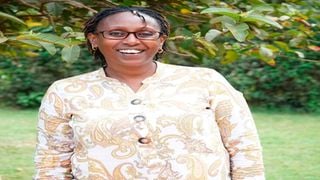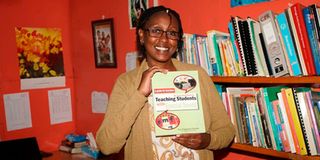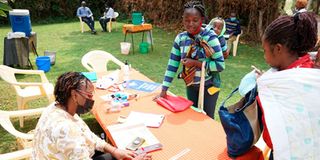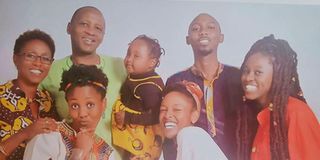
Eva Naputuni Nyoike, the founder and director of Acorn Special Tutorials.
| Thomas Rajula | Nation Media GroupLifestyle
Premium
Giving children with special needs a chance
What you need to know:
- Eva started the school at her parents’ home in Ngong in 1991.
- She had just come back from the US, where she had a good job.
It’s 1.30pm and Eva Naputuni Nyoike, founder and director of Acorn Special Tutorial in Dagoretti, has not moved from her station that is next to a temporary entrance they have made by creating a big opening in the school’s fence, since 7.30am.
The entrance leads to the school’s playing field that has been converted into a waiting and observation area for parents to have their children registered by the National Council for Persons With Disabilities (NCPWD).
Eva is assisting the parents to get numbers, ensure they have the documents needed for their children’s identification and fill out forms so that the young ones can see doctors, who assess them before they are registered by the council staff.
The initiative is a collaboration between the school, the Ministry of Health, the council and doctors, mostly from Mama Lucy Hospital in Nairobi. With Covid-19, the registration became tedious because the children can barely keep up with the preventive measures when trying to register them safely in the hospital.
“How many of our children are you seeing with masks on? You go to hospital, they’ll be touching surfaces and putting their hands in their mouths. But on the forms, children with Down syndrome, Attention Deficit Hyperactivity Disorder, autism and learning disabilities (dyslexia - reading, dysgraphia - writing, dyscalculia - maths) are all classified as ‘mental’. I explained to both the parents and the NCPWD that we need to be specific when registering the children because that data is important to determine the kind of help we get for our children,” says Eva.
She observes that people don’t know that with a national card from NCPWD, one can actually get free early intervention therapy for children under the age of five years. That is why she made the drive open to anyone from the public and not just parents from her school. Also, NCPWD is supposed to pay 75 per cent of the child’s school fees and provide things like canes and wheelchairs for persons with disabilities (PWDs).
“One of the people here today is a 31-year-old man who keeps chickens and pigs. But did he know that he’s exempted from paying taxes? He didn’t. The other thing is he didn’t know he has access to grants. I told him to come and listen to what he’s entitled to, including the fact that five per cent of any government-funded institution’s workforce should be made up of PWDs,” she says about the importance of registering oneself.
Some parents came from as far as Kitengela to register their children for the first time.
On this day, NCPWD registers 66 children by the time they close at 5:30pm.

Eva Naputuni Nyoike, the founder and director of Acorn Special Tutorials at 407 Muhuri Road, Dagoretti, on September 5, 2021.
Eva started the school in 1991 at her parents’ home in Ngong. She had just come back from the US, where she had a good job, but she believed God had not created her to work with American children.
The school is a haven for children with neurodiversity (Down syndrome, autism, cerebral palsy, and children with multiple disabilities like deaf and blind). Months before coming back, she had sent more than 200 job applications to Kenya. She got no response. She thought by the time she jetted in there would be something in her family’s mail box. She arrived, and still there was nothing but rejections.
Even when she walked into the Teachers Service Commission offices, at first she was told there were no job grades for someone with her qualifications. After much persistence, she was told the only place she would have fit in was as a teacher at the Kenya Institute of Special Education but that at 24 she was too young to teach people older than her. She went to Nation Centre and put out an advertisement in the Daily Nation newspaper, “Special education teacher looking for a job”.
“The next day, my phone rang off the hook. Parents drove all the way to Ngong and I would work with their children for an hour while they waited in their cars; that is how the word tutorial ended up in the school’s name,” explains Eva.
After she got married, she moved to Golf Course Estate in Nairobi and that is where the school became full-time. The school later moved to Lavington before finally settling down at its current location on Muhuri Road, Dagoretti.
She observes that in the beginning, it’s only parents who had means that would be aware about services that were available for their special needs children. But now with information readily available, even those in the vulnerable economic bracket are no longer locking their children in houses but bringing them out to the society.
“Some parents used to keep their children at home to protect them and not to hide them from stares and judgement,” says Eva.
Eva found her purpose at an early age. She always wanted to do special education even before she had encountered anyone with special needs. However, soon after finishing her A-Level education, she got pregnant. She delivered baby Papa safely. But three months later, the baby was taken ill. He was taken to a doctor who prescribed antibiotics for him.
“The antibiotics didn’t seem to help. We went back to the hospital and got admitted. At some point, the doctor came and told me Papa had haemophilia (severely reduced ability of blood to clot) and had bled into his brain. His words were, “He is going to be severely mentally retarded and the best thing to do is to let him rest (take him off life support). You are young and you can get another child any time,” remembers Eva.
Struggled with education
She prayed that her son wouldn’t die and that she would be the best mother to him in his condition. That Friday morning, she held Papa in her hands as the doctors went to switch off the machine. But Papa didn’t let go. He started to breathe on his own.
“While suckling, he would hold my index finger and look at me,” she says.
That Saturday they had prepared for his baptism at the house, but the pastor had to do it at the hospital. On Sunday, the two even had visitors at the hospital.
“On Monday at around 4pm, I was breastfeeding Papa and my best friend, my brother and grandfather were with me. All of a sudden Papa let go of my index finger. I looked at him and then he let go of my nipple. He seemed to be asleep. But I told my friend “Papa has just left us”. My brother went to call the nurse and they confirmed he had just died,” Eva remembers.
She became angry and bitter with God, and disconnected with everything. She soon left for the US to earn her BSc in Special Education at Lock Haven University in the state of Pennsylvania. Eva says she struggled with education while in Kenya, but when she got to the US she was excelling — even ending up on the Dean’s list (academic award, or distinction used to recognise the level of highest scholarship demonstrated by students in a college or university).
At Acorn Special Tutorials, the children are grouped according to their age and capabilities. Their early intervention programme has a mixture of children, including typical children in what they call reverse inclusion, to help those with special needs develop with their peers not only intellectually but also psychosocially. Going through phases of life with the peers will help them manoeuvre changes in their bodies and emotions, even though they will be taught differently due to their different abilities as they grow older, Eva explains.
“You won’t find us having a class where everyone is doing the same thing. In a class of seven students, you will find three teachers,” says Eva.
Following the introduction of the Competency Based Curriculum, the school has Baby Class, PP1, PP2, and Grades One to Three. They used to have a vocational class where students would create things. But that was for boarding students, which became unsustainable after Covid-19 hit the country last year. There are constructions going on in the compound to help them bring back the older students. There’s also physio and occupational therapy class.
The children are exposed to different activities such as music and dance, including playing instruments for coordination, attention and concentration.

Eva Naputuni Nyoike attends to parents at the school on September 5, 2021.
Eva’s daughter, Malaika, has Down syndrome. She loves music and gymnastics. Malaika even has sessions with Redfourth’s Phila Tuju. A boy called Caleb has cerebral palsy and is a good defensive football player. Some children with autism and Down syndrome are also excellent in swimming.
Eva’s other daughter, Naimutie, has Attention Deficit Hyperactivity Disorder (ADHD). Though she struggled in school and university, she is a fantastic art and music teacher.
“She connects so well with the children and has all these wonderful ideas. She didn’t finish university because she can’t sit in class for the duration of a lesson. She came here four years ago and she has been excelling,” says Eva.
The element of finances is the main challenge that parents face, even though the school tries to make it manageable. But surgery, medication and therapy are still very expensive because insurance companies are hesitant to offer policies for children with disabilities.
The other challenge is stigmatisation that the children still face in the society. This has seen parents create WhatsApp groups to have a sense of belonging, bonding with people who share similar struggles with their children because they feel that even their families treat them differently.
“I didn’t associate the school to Papa until years later when a mother of a child at the school was talking to me and I just started crying. God didn’t want me to be the best mother of one child, he wanted me to reach more children and be their best teacher. Any parent walking through that gate could have been me and Papa: What would I want to find, what actions would I want to see, what word would I want to hear? I would want to be embraced and told that it’s okay. The school is also a haven for the parents,” says Eva.
The school has group psychosocial therapy sessions with the parents, where a lot of tears are shed, but there are also moments of laughter and relief.

Eva, her husband Nyoike and their children Malaika, Kimani, Mwara, Wairimu and Naimutie.
“A lot of spouses have walked away from their partners, claiming sisi hatupatangi watoto kama hawa (we don’t get such children). There are lots of single mothers in different groups.”
There’s also lack of knowledge on how to handle or manage a child with special needs, Eva explains. A doctor had to show a father how to carry his cerebral palsied son during the registration.
For a long time, Acorn couldn’t rent space for the school because landlords would associate intellectual disability with aggression.
Eva has a Masters of Science in Inclusive Education from America’s Walden University in Minnesota and is also on the board of the Beyond Zero initiative by First Lady Margaret Kenyatta as the technical adviser on issues of disabilities.
She was called up due to her experience, which includes being the chairperson of the Kenya Private Schools Association’s Special Needs Education sub-committee.
Eva explains that last year, there was a pandemic of what is called virtual autism. As parents worked from home, they put their children between the age of two and five years in front of televisions and this led to the children having no speech and social skills. Eva told parents to cut out TVs and play with their children. After two months of working with the parents, coming up with “silly games” as the interactional tools, the children are now in mainstream schools.
Her other passion is training others on special education. In 2000, she got consultants from Kenyatta University to sit with her and come up with course content for diploma and certificate levels. The idea was to create awareness on special needs in mainstream schools and this programme ran till 2010.
“People are thirsty for knowledge on special education and it is so vast. For example, a topic on diet and special education. People will sit there and be like “Oh my! You mean there’s actually a connection?” When the teachers came, they were so green. By the time they were leaving, they were people I could call and ask to do an assessment or sit with assessors,” says Eva, who has also been involved with Daystar University and Riara University.
She also has her personal training programme, an online certificate course for early years teachers on inclusive education. The cohorts are trained on functional assessment, multiple intelligence, universal design for learning and individualised educational plans to ensure no child is left behind. After the training, they are supposed to go back and train other teachers in their schools. Eva was also part of the team involved in the scope, sequence and designing of the CBC.
“This is universal designed learning, a strategy that you use for all children bearing in mind that they are diverse,” says Eva.





